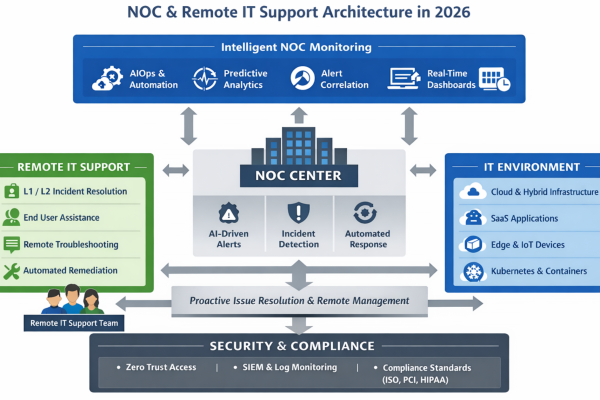The Role of AI and Automation in Security Incident Management
In today’s digital landscape, cybersecurity threats are constantly evolving. Organizations need advanced solutions to detect, analyze, and mitigate security incidents efficiently. This is where Security Incident Management Service in Mohali plays a crucial role in safeguarding sensitive data and maintaining business continuity. AI and automation have transformed security incident management, making it faster, more accurate, and more proactive.
Understanding Security Incident Management
Security Incident Management refers to the process of identifying, responding to, and resolving security threats that impact an organization’s infrastructure, data, and operations. It involves:
- Threat detection and monitoring
- Incident analysis and assessment
- Containment and mitigation
- Recovery and post-incident evaluation
Traditional approaches to security incident management relied heavily on manual processes, which were often slow and error-prone. AI and automation have revolutionized these processes by introducing efficiency, accuracy, and scalability.
How AI Enhances Security Incident Management
AI-driven security systems analyze vast amounts of data in real time to detect anomalies, predict threats, and automate responses. Here are key ways AI improves Security Incident Management Service:
1. Automated Threat Detection
AI-powered security tools continuously monitor networks, endpoints, and applications for suspicious activities. Using machine learning (ML) algorithms, they detect unusual patterns and behaviors, reducing false positives and enabling quick response to real threats.
2. Rapid Incident Analysis
AI helps security teams analyze incidents by:
Correlating data from multiple sources
Identifying attack patterns and trends
Providing real-time risk assessments
This reduces the time spent on manual analysis, allowing cybersecurity professionals to focus on high-priority threats.
3. Intelligent Response Automation
AI automates routine incident response tasks such as:
Blocking malicious IPs
Isolating compromised devices
Deploying security patches
Automated responses ensure swift containment of threats, minimizing damage to the organization.
4. Predictive Threat Intelligence
AI uses historical data to predict potential security threats before they occur. By leveraging predictive analytics, organizations can proactively strengthen their security measures and prevent attacks.
5. Enhanced Incident Reporting and Compliance
Security compliance is critical for businesses handling sensitive data. AI-powered systems generate comprehensive reports, ensuring compliance with standards such as ISO 27001, PCI DSS, and GDPR.
The Role of Automation in Security Incident Management
Automation streamlines security incident management by eliminating manual intervention in repetitive tasks. Here’s how automation benefits organizations:
1. Faster Incident Response
Automated security orchestration speeds up incident response, reducing the time between detection and mitigation.
2. Efficient Workflow Integration
Security automation integrates with existing security tools such as SIEM (Security Information and Event Management) and SOAR (Security Orchestration, Automation, and Response), improving collaboration and efficiency.
3. Reduced Human Error
Automation eliminates inconsistencies in incident handling, ensuring standardized and accurate responses.
4. Scalability
Automated security solutions scale easily to accommodate growing organizational needs, making them ideal for large enterprises.
Challenges of Implementing AI and Automation in Security Incident Management
Despite the advantages, organizations may face challenges in adopting AI and automation, including:
- High initial implementation costs
- Need for skilled personnel to manage AI-driven security systems
- Potential false positives requiring human oversight
- Privacy concerns related to automated data analysis
However, these challenges can be mitigated with the right strategy, training, and security framework.
Conclusion
AI and automation have become essential components of Security Incident Management Service, enabling organizations to detect, analyze, and mitigate threats efficiently. By leveraging AI-driven security solutions, businesses can enhance their cybersecurity posture, reduce response times, and minimize the impact of security incidents.
As cyber threats continue to evolve, adopting AI and automation in security incident management will be crucial for organizations aiming to stay ahead of potential risks. Investing in these technologies ensures a proactive, intelligent, and resilient approach to cybersecurity.
Author







